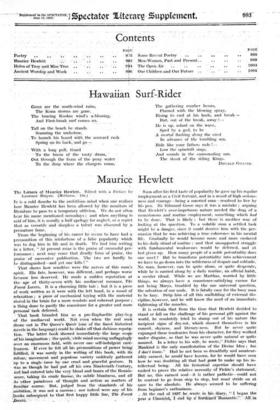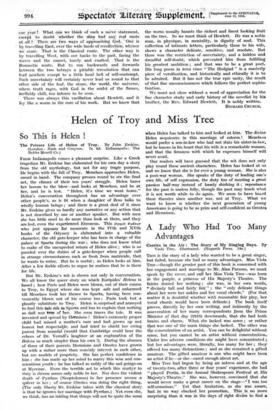Maurice Hewlett
IT is a cold douche- to the ambitious mind when one realizes how Maurice Hewlett has' been allowed- by' the- Monitors Of literature to pass- to a -temporary _oblixion: We do, not often • hear his name mentioned nowadays; and when anything is said of him, it is usually a half apology for neglect, or a regret that so versatile and sleepless a talent was obscured by u
premature fame. _ _ :' , .
'From the beginning of his . career he seems tci have had a premonition of this misfortune of a ‘false popularity whic.h was to dog him in life and in death. We find him writing in -a letter, "At present mine is the praise of successful per-' formance ; next may come that deadly form of praise, the praise of successive -publication. The two are -hardly to be distinguished—and yet one kills ! "
• That shows how sensitive were The nerves of this man's:
spirit. -His fate, however, was different, and perhaps worse because less deserved. He made a sadden reputation at the-- age of -thirty-seven -with his mediaeval romance, The Forest Lovers. It is a charming little tale ; but it is a piece Of work written as it *Were with the lefthand, -in a mood of relaxation; a' piece of inecharileal toYing with the niaterial- Stoiedin the brain for a More resolute and coherent purpose ; thing -done -to -pacify the conscience for -a greater and more -personal task deferred.
That took branded him as a pre-Raphaelite play-bcy: 'cif the mediaeval world. -Net 'even' when the real man shone 'out in- The Queen's Quafr (one of the finest. historical riciveLs-in the language) eould he-slialce 'off that dubious reput4.-' thin. - The' latter book Uhirwed iininediately-the large scoPe: of his imagination ; thequiok,-.virile-mind:inoVing Unflaggingly! over -an -enormous -field, -with -never. one- self-indulgent care-- fessness. If-ever he felt his premonitions of-power tieing. fulfilled,- it was surely in :the writing - of this. book, With its ifolouri- Movement -and populous variety .suddenly gathered - Up to a single. 'issue -by- one cruel and- graceful gesture. it Wita as though he had- put off his -.own 'Nineteenth Century, inil:had• entered into the Very blood arid-bon-ea of the ranee, 'taking its -crude ,finesse, its .tiubtle -bluntness, 'and all' its: =other paradoxes of Ahthight arid -salon as -matters_ Of" fumiliàI eou-:-Bat, judged from the !standards of his- ambition, it Was not a success ;. nor 'indeed were any of -his, .1.iooka Subsequent to-that - first happy little liar, The Poretrt.
' - r 7 -
Soon after his first taste of popularity he _gave up his regular employment ai a Civil Ser'vairt, and in a mood of high serious-
ness and courage—being a married-man—resolved to live by his pen. Sir Edmund Gosse says it was a mistake ; arguing that Hewlett's over-impetuous nature needed the drag of- a monotonous and routine employment, something which had
to be done. That is likely ; hut there' is another way of looking at the question. To a volatile man a settled task might be a danger, since it could deceive him with. the per-
suasion that he was achieving a true-coherence in his mental life. Gradually he would become more and more enslaved to his daily-ritual of routine ; and- that unsupported struggle
with ftmdamental weaknesses would be deferred, and at last given up. How many people of a noble potentiality does one meet ? But to transform potentiality into achievement we have to go down into the wilderness of despair and solitude. No man, however, can be quite alone, or quite desperate, while he is carried along by a daily routine, an official habit, a• secular ritual. While we are Martinis, worried by little things, we' always have a conscience-satisfying excuse for not being Marys, troubled by the one universal question, the salvation of our souls. It is fatally easy for the busy man to be lazy. • Strip him of all this scaffolding of external dis- cipline, however, and he will know the need of an immediate tightening of the muscles.
• It is certain that from the time that Hewlett decided to stand or fall on the challenge of his personal gift against the world, he resolutely tried to stamp out of his nature the incipient signs Of dry-rot, which showed themselves in his conceit,' shyness, and literary-ness. But he never . quite expunged these tendencies from his character, for they worked
under -disguise, so that he was never quite natural or quite assured. In a letter to his wife, he wrote," Fichte says that Mankind is the only .manifestation of the Divine Idea ; bul- k don't know." Had he not been so dreadfully and amateur- ishly earnest, he would have known, for he would have seen how he was doubting all that had gone to make up his in- tellectual- being. All his historical expertise should have rushed to prove the relative necessity Of Fichte's statement.- But no, this earnest soul—it is rather pathetic—could not be content- to go from step to step, but must stride on at once to the absolute. He always seemed to be suffering-
from -beginner's enthusiasm. .
• At-the end of 1897_he _wrote in his diary, 4., I began the year -a tlasiticist; f end tp1 ge haitlinecrRoinantic_AR, one year r What can we think of such a naive statement, excePt. to doubt ;whether the in had any real roots at all? There are two ways of approaching God. One is ;. by travelling East, over the wide lands of reoollecian, whence We came. That is the Classical route. The oilier way is by travelling West, with our backs to the past, facing the WaVes and the sunset, lonely and exalted. . That is the Romantic route. But to run backwards and forwards between the two betrays a pitiable irresolution that can lead nowhere except to a little local hell of self-contempt. Such uncertainty will 'certainly -never lead us round to that other side of the leaf, the stone, the world, the universe, Where truth rages, with God in the midst of the flames, ineffably chill, too intense to be seen.
There was always this vacillation about Hewlett, and it lay like a worm in the core of his work. But we know that
the worm usually haunts the richest and finest looking fruit on the tree. So we must think of Hewlett. He was a noble man, in physique, in mentality, in dignity of soul. This collection of intimate letters, particularly those to his wife, shows a character delicate, sensitive, and resolute. But there was the restriction of .uncertainty, and a hidden and dreadful self-doubt, which prevented him from fulfilling his greatest ambition ; and that was to be a great poet. His long poem in terza rima "The Hodgiad " is a masterly piece of versification, and historically and ethically it is to be admired. -But it has not the true -epic unity, the result of that fine unconsciousness- 'which follows the perfect sophis- tication.
We 'must notclose without a word of appreciation for the fine character study and early history of the novelist by his brother, the Rev. Edward Hewlett. It is nobly written. ' RICHARD CHURCH.























































 Previous page
Previous page